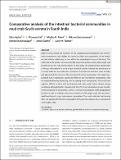Files in this item
Comparative analysis of the intestinal bacterial communities in mud crab Scylla serrata in South India
Item metadata
| dc.contributor.author | Apine, Elina | |
| dc.contributor.author | Rai, Praveen | |
| dc.contributor.author | Mani, Madhu K. | |
| dc.contributor.author | Subramanian, Vikram | |
| dc.contributor.author | Karunasagar, Indrani | |
| dc.contributor.author | Godhe, Anna | |
| dc.contributor.author | Turner, Lucy M. | |
| dc.date.accessioned | 2021-11-19T09:30:22Z | |
| dc.date.available | 2021-11-19T09:30:22Z | |
| dc.date.issued | 2021-05-01 | |
| dc.identifier | 276631923 | |
| dc.identifier | b5afdad2-f48d-4c5c-84ec-b62c8cc1786e | |
| dc.identifier | 000656486900011 | |
| dc.identifier | 85105331244 | |
| dc.identifier.citation | Apine , E , Rai , P , Mani , M K , Subramanian , V , Karunasagar , I , Godhe , A & Turner , L M 2021 , ' Comparative analysis of the intestinal bacterial communities in mud crab Scylla serrata in South India ' , Microbiology Open , vol. 10 , no. 2 , e1179 . https://doi.org/10.1002/mbo3.1179 | en |
| dc.identifier.issn | 2045-8827 | |
| dc.identifier.other | ORCID: /0000-0001-5423-8792/work/103138188 | |
| dc.identifier.uri | https://hdl.handle.net/10023/24368 | |
| dc.description | This work was supported by a PhD scholarship granted by the University of Plymouth to EA (PI LMT). | en |
| dc.description.abstract | Little is known about the functions of the crustacean gut microbiome, but environmental parameters and habitat are known to affect the composition of the intestinal microbiome, which may in turn affect the physiological status of the host. The mud crab Scylla serrata is an economically important species, and is wild-caught, and farmed across the Indo-Pacific region. In this study, we compared the composition of the gut microbiome (in terms of gut microbial species richness and abundance) of S. serrata collected from wild sites, and farms, from the east and west coast of India, and also tested the effects of the environment on the composition. The water temperature had a statistically significant effect on gut microbiome composition, with microbial biodiversity decreasing with increasing water temperature. This could have negative effects on both wild and farmed mud crabs under future climate change conditions, although further research into the effects of temperature on gut microbiomes is required. By comparison, salinity, crab mass and carapace width, geographical location as well as whether they were farmed or wild-caught crabs did not have a significant impact on gut microbiome composition. The results indicate that farming does not significantly alter the composition of the gut microbiome when compared to wild-caught crabs. | |
| dc.format.extent | 10 | |
| dc.format.extent | 1030703 | |
| dc.language.iso | eng | |
| dc.relation.ispartof | Microbiology Open | en |
| dc.subject | 16S rRNA | en |
| dc.subject | Aquaculture | en |
| dc.subject | Bacterial diversity | en |
| dc.subject | Gut microbiome | en |
| dc.subject | Mud crab | en |
| dc.subject | Nanopore sequencing | en |
| dc.subject | QR Microbiology | en |
| dc.subject | DAS | en |
| dc.subject | SDG 13 - Climate Action | en |
| dc.subject | SDG 14 - Life Below Water | en |
| dc.subject.lcc | QR | en |
| dc.title | Comparative analysis of the intestinal bacterial communities in mud crab Scylla serrata in South India | en |
| dc.type | Journal article | en |
| dc.contributor.institution | University of St Andrews. School of Geography & Sustainable Development | en |
| dc.identifier.doi | 10.1002/mbo3.1179 | |
| dc.description.status | Peer reviewed | en |
This item appears in the following Collection(s)
Items in the St Andrews Research Repository are protected by copyright, with all rights reserved, unless otherwise indicated.

